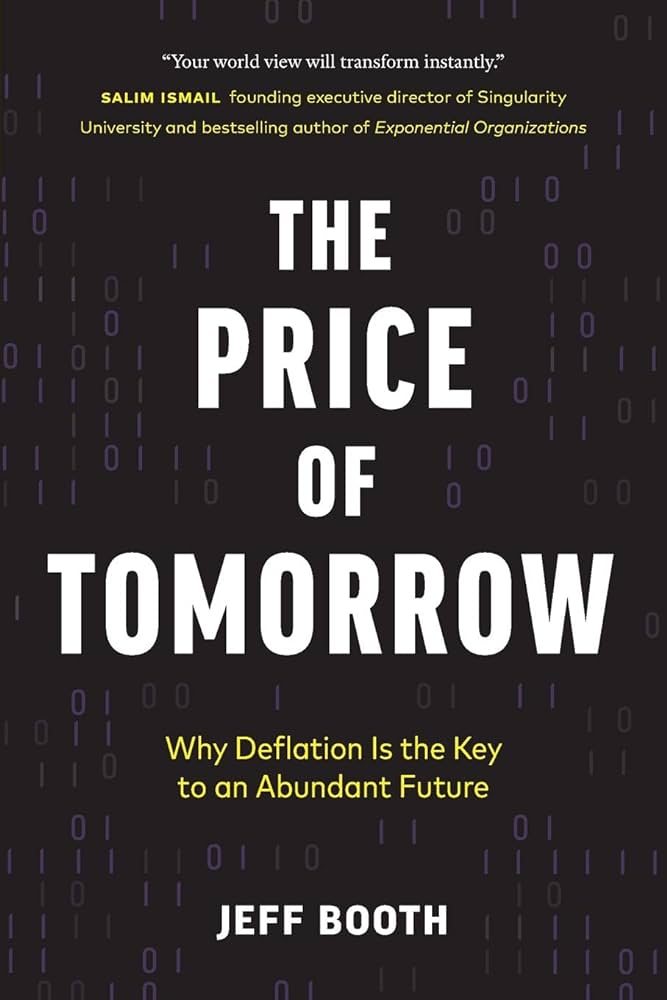“In a world of technological abundance, pursuing inflation is akin to running ever faster towards a horizon that recedes with each step.”
If technology is deflationary, shouldn’t growth in a post technology world see a falling GDP?
What if our economies are actually deflating, we just can’t see it because it’s masked by debt-fueled inflation to maintain our current concept of growth (GDP growth)?
Jeff Booth’s “The Price of Tomorrow” argues that technology-driven deflation is inevitable and beneficial, challenging the inflationary policies that dominate current economic thinking.
The Chapters of the Book
- The Deflationary Nature of Technology: Explores how technological advancements reduce costs and increase efficiency, leading to deflation.
- The Inflationary Policy Trap: Discusses how current economic policies aim to fight deflation, causing potential long-term harm.
- The Impact on Employment: Analyzes how automation and AI affect job markets and what that means for future employment.
- Wealth Inequality: Examines how the clash between technological progress and economic policies exacerbates wealth inequality.
- The Future of Money: Speculates on the evolution of money in a technology-driven economy.
- Navigating the Transition: Offers insights on how societies might transition to embrace deflation without societal breakdown.

Powerful Quotes from the Book:
- “We are at a unique crossroads in human history, where the impact of technology could fundamentally reshape our economic future.”
- “Inflation is the silent thief in an economy that values growth above all else.”
- “The real challenge of our time is not scarcity, but our inability to recognize the abundance technology creates.”
- “Efficiency and productivity, powered by technology, are the real wealth of nations.”
- “The greatest risk is not the technology itself, but our response to it.”
- “Economic policies are fighting the natural course of technology-driven deflation, creating more problems than solutions.”
- “Adapting to a deflationary future requires rethinking value, wealth, and what it means to work.”
- “Wealth inequality is not just an economic issue; it’s a symptom of a deeper technological and policy misalignment.”
- “The future belongs to those who can envision a world where technology serves humanity, not the other way around.”
- “Embracing deflation is about embracing abundance, and letting go of the fear of scarcity.”
Book Review:
Jeff Booth’s “The Price of Tomorrow” is a compelling read that challenges conventional economic wisdom. Booth argues persuasively that the technological advancements driving deflation are not to be feared but embraced as pathways to an abundant future. The book’s strength lies in its clear exposition of complex ideas, making it accessible to readers without a background in economics. Booth provides a thought-provoking analysis of current economic policies, suggesting that these may be ill-suited for a future shaped by rapid technological progress. While some may find his arguments controversial, Booth’s optimism about technology’s potential to create abundance is infectious. However, the book would have benefited from a deeper exploration of how societies can transition to this future without significant disruption.
Key Concepts:
- The inevitability of technology-driven deflation.
- The mismatch between our economic models and technological reality.
- The potential for technology to reduce inequality and create abundance.
- The need for new economic policies that embrace, rather than resist, deflation.
About The Author:
Jeff Booth is an entrepreneur and technology visionary with a keen insight into how technology affects economies and societies. With a background in building successful technology companies, Booth draws on his experiences to offer a unique perspective on the challenges and opportunities posed by technological progress.
Main Critiques of the Book:
- Overoptimism on Technology: Some critics argue Booth may be too optimistic about technology’s ability to solve societal problems.
- Underestimation of Transition Challenges: The book might underestimate the societal and economic disruptions caused by rapid technological change.
- Lack of Detailed Policy Solutions: While critiquing current policies, the book offers few concrete alternatives.
- Potential for Technological Unemployment: Critics argue Booth downplays the risks of widespread unemployment due to automation.
- Assumption of Rational Actors: The book assumes economic and political actors will make rational decisions in response to technological change.
- Global Perspective: Some feel the book lacks a global perspective, focusing primarily on Western economies.
- Technological Determinism: The argument sometimes leans towards technological determinism, underplaying human agency in shaping the future.
- Addressing Inequality: There is a critique that the book doesn’t sufficiently address how to tackle existing inequalities exacerbated by technology.
Main Critiques of the Book:
- Overoptimism on Technology: Some critics argue Booth may be too optimistic about technology’s ability to solve societal problems.
- Underestimation of Transition Challenges: The book might underestimate the societal and economic disruptions caused by rapid technological change.
- Lack of Detailed Policy Solutions: While critiquing current policies, the book offers few concrete alternatives.
- Potential for Technological Unemployment: Critics argue Booth downplays the risks of widespread unemployment due to automation.
- Assumption of Rational Actors: The book assumes economic and political actors will make rational decisions in response to technological change.
- Global Perspective: Some feel the book lacks a global perspective, focusing primarily on Western economies.
- Technological Determinism: The argument sometimes leans towards technological determinism, underplaying human agency in shaping the future.
- Addressing Inequality: There is a critique that the book doesn’t sufficiently address how to tackle existing inequalities exacerbated by technology.
Related Books:
- “The Second Machine Age” by Erik Brynjolfsson and Andrew McAfee
- “Race Against the Machine” by Erik Brynjolfsson and Andrew McAfee
- “The Third Wave” by Alvin Toffler
- “Sapiens: A Brief History of Humankind” by Yuval Noah Harari
- “Capital in the Twenty-First Century” by Thomas Piketty
